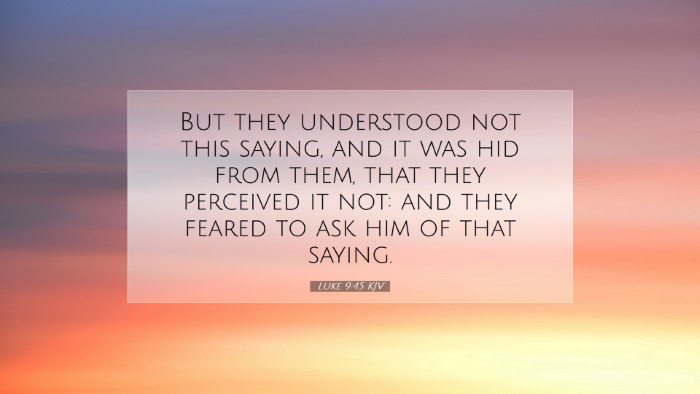Commentary on Luke 9:45
Verse: Luke 9:45 - "But they understood not this saying, and it was hid from them, that they perceived it not: and they feared to ask him of that saying."
Introduction
This verse appears amidst a significant portion of Luke's Gospel where Jesus is preparing his disciples for the realities of his impending death and resurrection. In examining this text, we shall glean insights from notable public domain commentaries including those of Matthew Henry, Albert Barnes, and Adam Clarke, each providing a rich perspective on the nuances of this passage.
Understanding the Disciples' Perception
Matthew Henry emphasizes the spiritual blindness of the disciples at this time. He suggests that their inability to grasp Jesus' words highlights a theme running throughout the Gospels: the resistance to comprehend the nature of Christ's mission, which often contradicted their expectations of a messianic leader who would restore Israel's political power.
Albert Barnes elaborates on this by explaining that the phrase “it was hid from them” illustrates a divine withholding of understanding. This action serves to fulfill God’s greater plan, showing that even faithful disciples can struggle with divine truths, particularly those that challenge their preconceived notions.
Adam Clarke notes the implications of fear surrounding this lack of understanding. The disciples’ hesitation to seek clarification from Jesus points to their struggle with doubt and the gravity of the teachings they received. This fear reflects the human condition when faced with profound spiritual truths that provoke uncertainty.
Spiritual Blindness and Divine Revelation
Henry further argues that spiritual blindness can be a direct consequence of a heart not fully yielded to God. The disciples, despite being close to Jesus, faced layers of misunderstanding simply because they expected a different narrative of the Messiah. Their preconceived ideas obstructed their ability to embrace the paradoxical truth of Jesus’ suffering and glory.
Barnes suggests that this passage teaches about the progressive nature of revelation. While the prophets of old had foretold the suffering of the Messiah, the prevailing expectations of a conquering king overshadowed these teachings. Thus, Jesus had to prepare them gradually for the impending reality of his passion.
Clarke reinforces this idea by suggesting that divine revelation is often given in accordance with our readiness to receive it. The disciples were not prepared to comprehend the depth of Christ’s statement regarding his death. Their spiritual maturity had not reached a level where they could understand the necessity of suffering in the divine plan of salvation.
Application for Modern Believers
This verse invites contemporary Christians to reflect on their own understanding of God’s word and the revelations provided in Scripture. Like the disciples, believers today may experience moments of confusion when faced with profound truths about God’s redemptive work.
Matthew Henry’s commentary challenges believers to recognize the need for humility and openness in their pursuit of spiritual understanding. He advises that prayerful study of God's word, accompanied by a willingness to accept truths that may contradict personal beliefs, is crucial for growth.
Barnes encourages modern believers to engage with Scripture diligently. He underscores that asking questions and seeking understanding should be embraced, as God delights in those who earnestly search for knowledge. The fear shown by the disciples should not deter believers but rather serve as a prompt to delve deeper into the word of God.
Clarke further states that believers must cultivate a childlike faith that is willing to learn from Christ. He encourages a disposition characterized by trust and openness, enabling the Holy Spirit to reveal deeper truths over time, moving from intellectual understanding to heartfelt conviction.
Conclusion
In summary, Luke 9:45 offers rich insight into the themes of spiritual blindness, divine revelation, and the importance of humility in seeking God’s truth. The compounding insights from Matthew Henry, Albert Barnes, and Adam Clarke collectively remind us that understanding God’s word is a journey of faith, often requiring patience and a spirit willing to embrace the mystery of God’s plan. As believers engage with Scripture, they are encouraged to foster an environment where questions are welcomed, and understanding flourishes, thus deepening their walk with Christ.


